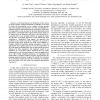Free Online Productivity Tools
i2Speak
i2Symbol
i2OCR
iTex2Img
iWeb2Print
iWeb2Shot
i2Type
iPdf2Split
iPdf2Merge
i2Bopomofo
i2Arabic
i2Style
i2Image
i2PDF
iLatex2Rtf
Sci2ools
129
click to vote
ICRA
2008
IEEE
2008
IEEE
A Bayesian approach to empirical local linearization for robotics
— Local linearizations are ubiquitous in the control of robotic systems. Analytical methods, if available, can be used to obtain the linearization, but in complex robotics systems where the dynamics and kinematics are often not faithfully obtainable, empirical linearization may be preferable. In this case, it is important to only use data for the local linearization that lies within a “reasonable” linear regime of the system, which can be defined from the Hessian at the point of the linearization— a quantity that is not available without an analytical model. We introduce a Bayesian approach to solve statistically what constitutes a “reasonable” local regime. We approach this problem in the context local linear regression. In contrast to previous locally linear methods, we avoid cross-validation or complex statistical hypothesis testing techniques to find the appropriate local regime. Instead, we treat the parameters of the local regime probabilistically and use approximat...
Related Content
| Added | 30 May 2010 |
| Updated | 30 May 2010 |
| Type | Conference |
| Year | 2008 |
| Where | ICRA |
| Authors | Jo-Anne Ting, Aaron D'Souza, Sethu Vijayakumar, Stefan Schaal |
Comments (0)

